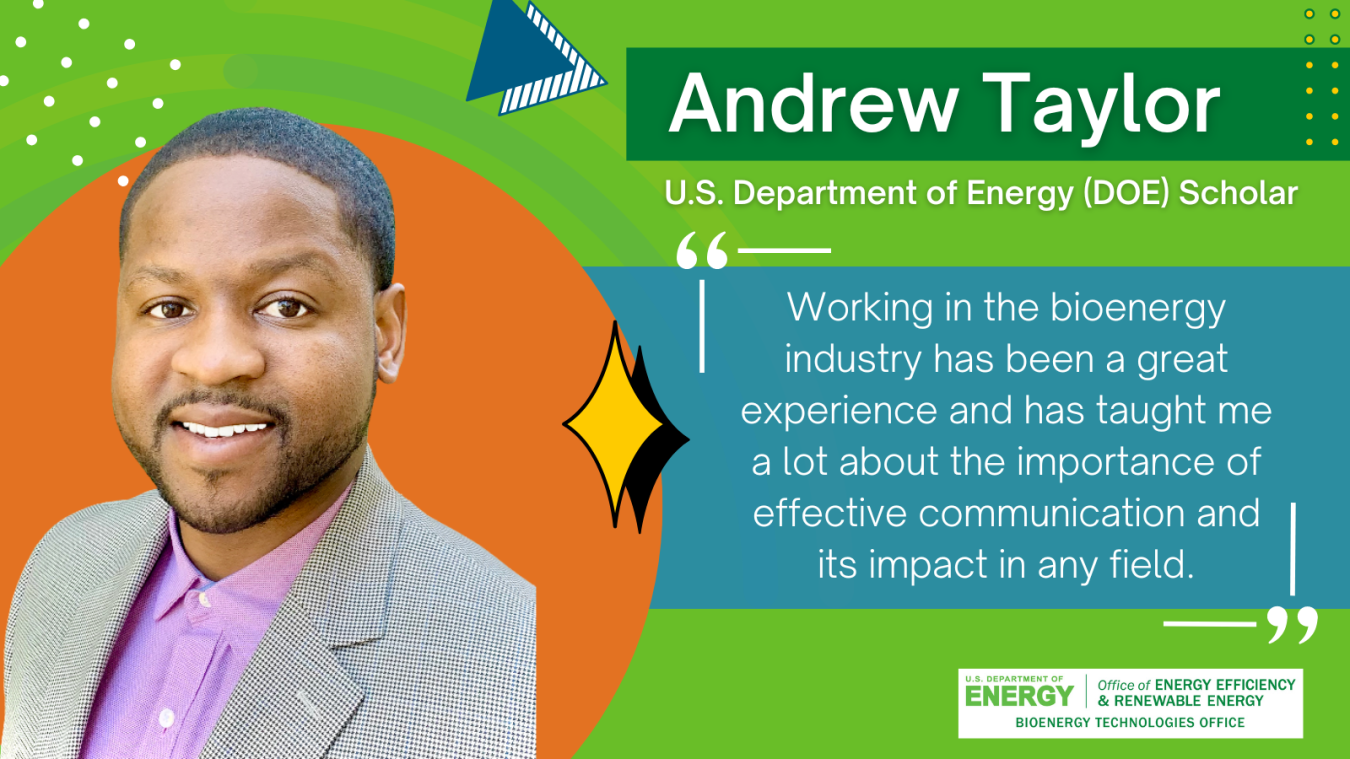I never thought I would find myself working in the bioenergy industry. I majored in business and graphic design and have always been interested in sustainability and cleantech, but I never thought my skills would be applicable in a science-related field.
September 28, 2022
Andrew Taylor, DOE Scholar
Bioenergy Technologies Office
U.S. Department of Energy
I never thought I would find myself working in the bioenergy industry. I majored in business and graphic design and have always been interested in sustainability and cleantech, but I never thought my skills would be applicable in a science-related field.
However, when I discovered a Minority Educational Institution Student Partnership Program (MEISPP) summer internship opportunity with the U.S. Department of Energy (DOE) Bioenergy Technologies Office (BETO) communications team, I decided to go for it. And I'm so glad I did! After my summer internship concluded, I started a fellowship with the team as a DOE Scholar. Working in the bioenergy industry has been a great experience and has taught me a lot about the importance of effective communication and its impact in any field.
Cleantech Work is also Non-Technical
The first thing I learned at BETO was that you don't need a science degree to work in the bioenergy industry—the bioeconomy has space for a wide variety of talents. I also learned there is a lot of overlap between different fields and knowledge from one area can be applied to another. Although my background is in business management and graphic design, I applied my skills to help BETO with:
- Project management
- Marketing
- Stakeholder engagement
- Graphic design
- Communication materials
Communication Requires Exposure
My summer internship included becoming familiar with BETO processes and technologies, as well as its stakeholders. I learned that when people think of clean energy, solar and wind usually come to mind, not bioenergy. I also realized that many organizations are missing out on collaborative opportunities because they lack awareness of what BETO does.
During my summer internship, I worked closely with the communications lead, Sheila Dillard, and colleague Ashley Lovett to develop a media strategy to give BETO more exposure to bioenergy markets and increase public awareness of the office. This included researching trends in the bioenergy space, identifying digital and print opportunities, and developing communications messaging and content to pitch to media outlet prospects.
After presenting the media strategy to BETO leadership and receiving their buy-in, I continued working with the team to execute the strategy as a DOE Scholar Fellow. So far, the strategy has significantly increased BETO’s social presence (Impressions: +64%; Profile Visits: +115%; Mentions: +278%) and helped BETO leaders gain exposure through interviews on major media outlets such as Waste360's Nothing Wasted Podcast and Dow's Plastics Unwrapped.
Plain Language Is Key
One of the most important things I have learned while working with the BETO communications team is the importance of effective communication. In any field, but especially in science and technology, it is essential to communicate complex ideas clearly and concisely. Without effective communication, the great work BETO conducts and supports would fail to reach a broad audience.
To help widen BETO's audience, I developed several bioenergy-related STEM factsheets and a new edition coloring and activity book for students and educators. With these resources, students will be able to learn about the:
- Science behind bioenergy
- Different types of bioenergy technologies
- Potential benefits of bioenergy.
I hope these resources will inspire students to pursue careers in science, technology, engineering, and mathematics (STEM) and help educators bring the topic of bioenergy to life in their classrooms.
Your Journey Awaits
As mentioned earlier, the bioeconomy is looking to transform a wide variety of talented individuals into clean energy champions. Non-technical individuals should not be intimidated by working in clean energy! Scientists and technology managers rely on the non-technical workforce to help them get the word out about the great work they are doing.
The clean energy workforce needs curious individuals with talents ranging from communications, graphic design, education, and outreach, to engineering, business operations, and management. Working in the bioenergy industry has been the experience of a lifetime, and I hope my journey encourages others to seriously consider clean energy careers.

